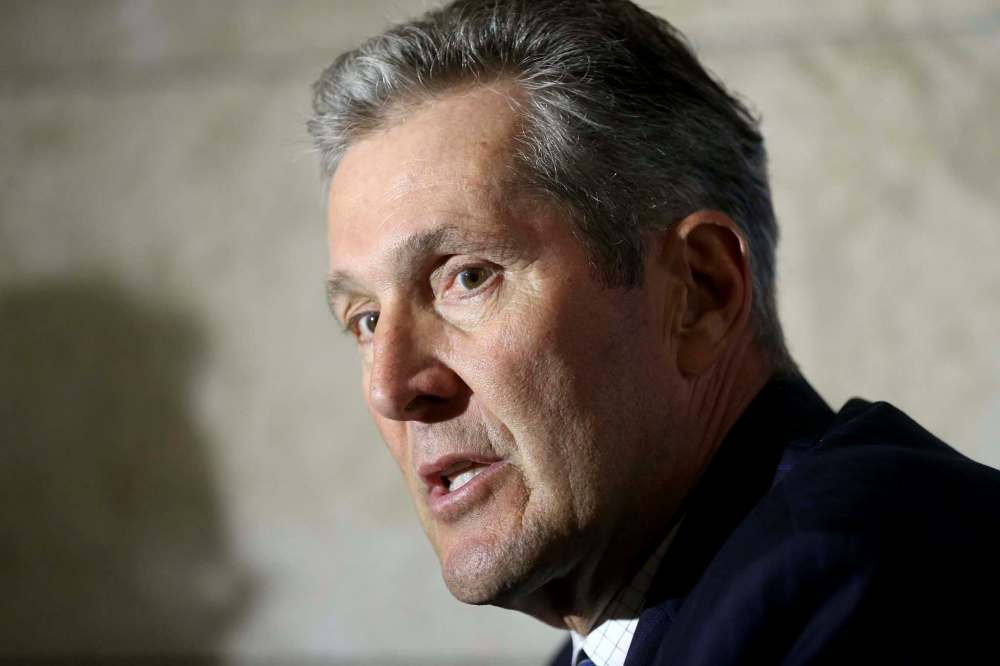Pallister’s health-care feud drags on
Activists, federal officials urge province to sign on to accord, access funding
Advertisement
Read this article for free:
or
Already have an account? Log in here »
To continue reading, please subscribe:
Monthly Digital Subscription
$19 $0 for the first 4 weeks*
- Enjoy unlimited reading on winnipegfreepress.com
- Read the E-Edition, our digital replica newspaper
- Access News Break, our award-winning app
- Play interactive puzzles
*No charge for 4 weeks then billed as $19 every four weeks (new subscribers and qualified returning subscribers only). Cancel anytime.
Read unlimited articles for free today:
or
Already have an account? Log in here »
Hey there, time traveller!
This article was published 20/07/2017 (2464 days ago), so information in it may no longer be current.
Premier Brian Pallister says he doesn’t believe the province is in danger of losing out on new federal funding for home-care and mental-health services — even if it fails to negotiate a deal with Ottawa.
The federal government would not permit a “two-tiered” system in which every other jurisdiction got federal cash and Manitoba didn’t, he said Friday.
But community activists and the province’s NDP Opposition are worried patients who need the services on offer will suffer as the premier digs in his heels in a dispute over health payment transfers.

On Thursday, Federal Health Minister Jane Philpott said in Winnipeg federal funds for home care and mental health are about to be distributed to all Canadian provinces and territories — except for Manitoba, which has yet to sign an accord with Ottawa.
At a news conference Friday, Pallister said it “would just be wrong” for the federal government to fund all other jurisdictions except his.
He added that his fellow premiers agree with him — and told him as much at a meeting in Edmonton earlier this week.
“There is an important thing to understand here: there are two different debates happening simultaneously, two different discussions happening, and they’re not linked. They shouldn’t be linked,” Pallister said, referring to funding for home care and mental health and the decision by Ottawa to reduce the size of annual federal health transfer increases to three per cent from six per cent.
All provinces opposed the new health-transfer plan and continued to balk at it when the federal Liberals sweetened the pot by offering them $11 billion over 10 years for mental-health and home-care services.
Eventually, every other province and territory signed a deal with Ottawa — with several negotiating extras, such as additional supports to battle opioid addiction.
Manitoba remains the one jurisdiction out in the cold.
A federal official reiterated Friday the province must come to the negotiating table before the mental-health and home-care funds flow.
“We hope that Manitoba will be able to sign an agreement with the federal government, as funds will be available to them for mental health and home care. However, the transfer of those funds cannot occur until an agreement is reached,” said Andrew MacKendrick, Philpott’s press secretary.
Kate Kehler, executive director of the Social Planning Council of Winnipeg, said Manitobans need the money sooner rather than later.
“The lack of availability (for mental-health services) always falls on the most marginalized in our community,” she said, and the need for home care is “overwhelming.”

“We want to keep people out of hospitals. We want them out of hospitals sooner rather than later. And we want to keep them from entering long-term care (nursing homes). That is what home care is designed to do,” Kehler said.
Pallister said he doesn’t feel compelled to sign a “phony” accord, as Ottawa arbitrarily lowered the annual increase in federal health transfers without consulting the provinces and territories. He said the new funding arrangement is unsustainable for Manitoba, where his government has axed several health programs to rein in burgeoning costs.
NDP health critic Matt Wiebe said even if Pallister were correct that home-care and mental-health funds could flow to Manitoba without a signed agreement, the premier’s tactics are questionable.
“It defies logic… This isn’t better negotiation… It really does seem that political gamesmanship is overtaking any kind of real effort on behalf of the premier to get a better deal,” he said.
Meanwhile, MacKendrick said in signing a deal with Ottawa, Manitoba wouldn’t so much be acquiescing to the lower transfer increases it so strenuously objects to, but agreeing to certain conditions before receiving the mental-health and home-care funds.
The conditions relate to agreeing to conduct health outcome assessments and other “accountability” measures, he said.
larry.kusch@freepress.mb.ca

Larry Kusch
Legislature reporter
Larry Kusch didn’t know what he wanted to do with his life until he attended a high school newspaper editor’s workshop in Regina in the summer of 1969 and listened to a university student speak glowingly about the journalism program at Carleton University in Ottawa.


